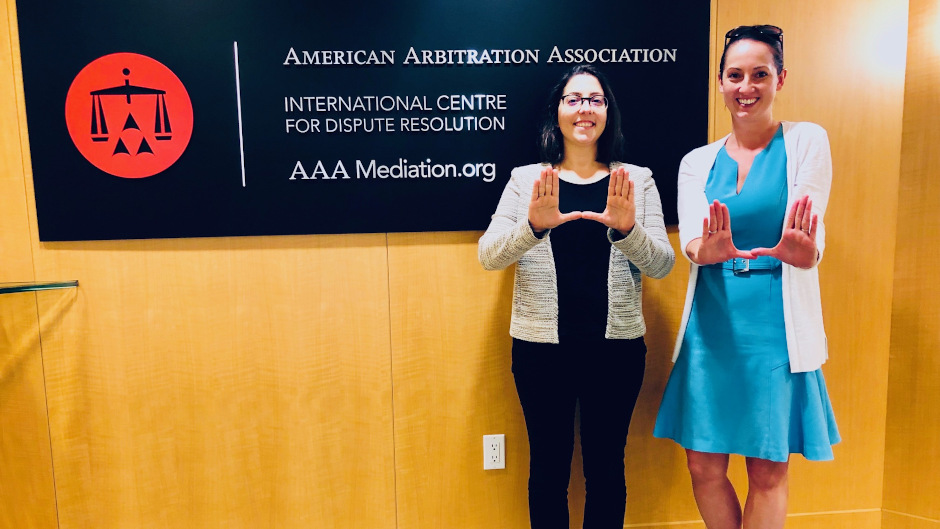Kicking-off the Spring semester, students of Miami Law’s White & Case International Arbitration LL.M. Program visited the offices of the International Center for Dispute Resolution in Downtown Miami. ICDR – the international wing of the American Arbitration Association – is one of the leading arbitral institutions providing dispute resolution services around the globe with more than 1,000 cases filed per year. The students were hosted by Ana Lombardia, ICDR’s International Case Director, who manages cases for the Latin America, Spain and Portugal regions.
Lombardia, a graduate of Miami Law’s International Arbitration LL.M. Program herself, gave the students a behind-the-scenes tour of ICDR’s offices and provided them with an overview on ICDR’s mechanisms and procedures. The students learned about the major differences between institutional and ad hoc arbitration proceedings, the AAA-ICDR Clause Builder tool which assists parties in the drafting of arbitration clauses and helps them avoid classic drafting mistakes that can lead to pathologically defective arbitration clauses, notable differences between the ICDR Arbitration Rules meant for international disputes and the AAA’s Commercial Arbitration Rules meant for domestic disputes, as well as the special appointment mechanism for AAA/ICDR arbitrators referred to as rank-and-strike method. Lombardia also noted that arbitral institutions such as ICDR are playing an important role in fostering diversity in the field.
“As an alumna of the program myself, it was a pleasure hosting students from Miami Law’s International Arbitration LL.M. for a visit of our offices,” says Lombardia. She and the students had a lively discussion on the role of arbitral institutions including furthering diversity in international arbitration. “Arbitral institutions such as ICDR are fierce and effective advocates for diversity in the industry. Most arbitral institutions have developed and implemented initiatives to foster diversity. These initiatives entail, for example, that I as case manager must meet specific diversity requirements when preparing a list of neutrals for the parties’ consideration. On the contrary, in an ad hoc arbitration proceeding the parties are not normally compelled to meet any diversity requirement when appointing a tribunal.”
Irina Mocanu, a Romanian lawyer who is pursuing her J.D./LL.M. Joint Degree in International Arbitration, says “the site visit provided a great opportunity for me and my fellow students to understand the inner workings and objectives of the ICDR and also how it differs from its domestic sister organization, the AAA.”
The Program regularly provides students with the opportunity to attend international arbitration conferences, lectures and other networking events with international arbitration practitioners, in Miami and beyond. “We believe that it is a very important part of our students’ LL.M. experience to connect with the international arbitration community and to have the opportunity to discuss current issues in international arbitration, such as arbitrator appointment and diversity, with seasoned practitioners and academics in this field,” says Sandra Friedrich, Director of the White & Case International Arbitration LL.M. Program, who arranged for the visit.
Somya Priyadarshini, a lawyer from India who recently joined the International Arbitration LL.M. program and plans to sit for the New York Bar Exam upon graduation, adds, “this program has been a hands-on learning experience providing a better understanding of the various issues and questions that can arise throughout an international arbitration case. The program brings together highly distinguished international arbitration practitioners who teach a very diverse group of students, thus furthering comparative analyses of international arbitration practices worldwide.
***
The White & Case International Arbitration LL.M. Program, under the leadership of Professor Jan Paulsson, holder of the Michael Klein Distinguished Scholar Chair, provides a unique individualized educational opportunity for a small group of top-quality students from around the globe, wishing to acquire an in-depth grounding in the field of international arbitration as a platform for a successful career. The program - the only one of its kind in the United States - is open to U.S. and foreign-trained law graduates, and is ideal for newcomers to the field or experienced practitioners looking to enrich their skills and knowledge.

